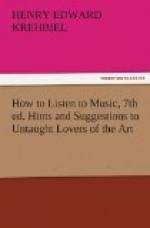[Sidenote: Duties of the critic.]
[Sidenote: The musician’s duty toward the critic.]
But if this be so we ought plainly to understand the duties and obligations of the critic; perhaps it is because there is much misapprehension on this point that critics’ writings have fallen under their own condemnation. I conceive that the first, if not the sole, office of the critic should be to guide public judgment. It is not for him to instruct the musician in his art. If this were always borne in mind by writers for the press it might help to soften the asperity felt by the musician toward the critic; and possibly the musician might then be persuaded to perform his first office toward the critic, which is to hold up his hands while he labors to steady and dignify public opinion. No true artist would give up years of honorable esteem to be the object for a moment of feverish idolatry. The public are fickle. “The garlands they twine,” says Schumann, “they always pull to pieces again to offer them in another form to the next comer who chances to know how to amuse them better.” Are such garlands worth the sacrifice of artistic honor? If it were possible for the critic to withhold them and offer instead a modest sprig of enduring bay, would not the musician be his debtor?
[Sidenote: The critic should steady public judgment.]
[Sidenote: Taste and judgment must be achieved.]
Another thought. Conceding that the people are the elemental power that Hiller says they are, who shall save them from the changeableness and instability which they show with relation to music and her votaries? Who shall bid the restless waves be still? We, in America, are a new people, a vast hotch-potch of varied and contradictory elements. We are engaged in conquering a continent; employed in a mad scramble for material things; we give feverish hours to win the comfort for our bodies that we take only seconds to enjoy; the moments which we steal from our labors we give grudgingly to relaxation, and that this relaxation may come quickly we ask that the agents which produce it shall appeal violently to the faculties which are most easily reached. Under these circumstances whence are to come the intellectual poise, the refined taste, the quick and sure power of analysis which must precede a correct estimate of the value of a composition or its performance?




